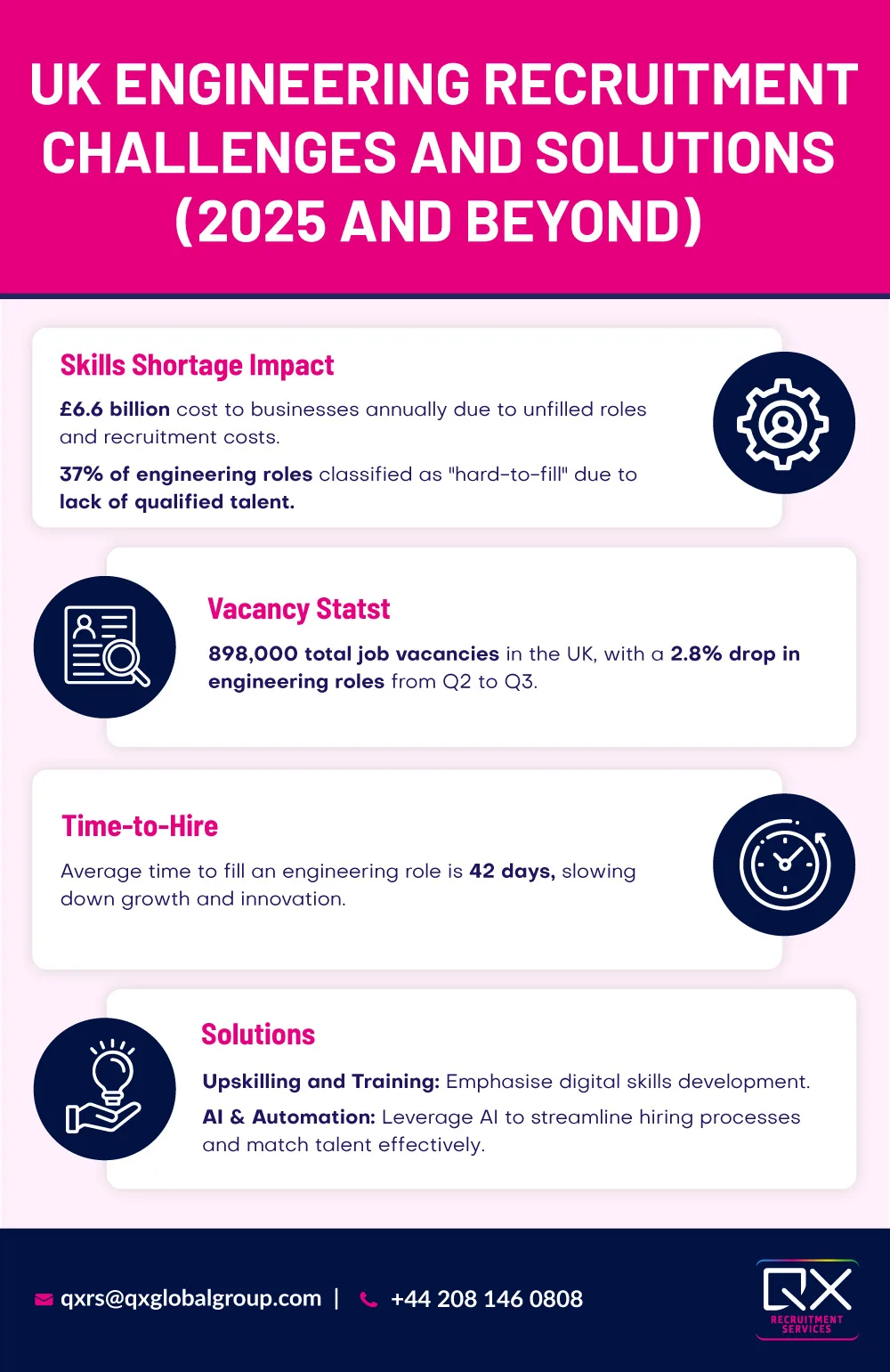Topics: Engineering Recruitment
The Clock Is Ticking: Confronting Engineering Recruitment Challenges in Q3 for Future Success
Posted on October 11, 2024
Written By Abishek Balakumar

The British Chambers of Commerce (BCC) Insights Unit’s latest report has shed light on the growing recruitment crisis in the UK’s engineering sector. According to the Quarterly Recruitment Outlook (QRO), 82% of engineering firms are now facing severe difficulties in hiring skilled professionals—a sharp rise from 66% in Q1. This alarming trend highlights the urgent need for companies to rethink their recruitment strategies as we move toward 2025.
Engineering Recruitment Challenges in Q3
Recruitment difficulties across sectors are on the rise, but the engineering sector stands out as one of the hardest hit. Jane Gratton, BCC Deputy Director of Public Policy, commented, “The sharp rise in recruitment challenges in engineering is particularly worrying.” This dramatic increase stems from two key factors: a widening technical skills shortage and escalating labour costs.
The Impact of Skills Shortages
The BCC QRO report indicates that 43% of firms are specifically struggling with technical skills gaps, particularly in critical roles such as mechanical, civil, and electrical engineering. As these fields require highly specialised expertise, the shortage of talent threatens not only project timelines but also overall growth and innovation within the sector.
With advancements in Industry 4.0 technologies—including automation, AI, and digital transformation—the need for specialised engineering talent is growing faster than ever. The EngineeringUK report revealed that the sector needs an additional 203,000 engineers annually until 2024 just to meet demand. This skills gap continues to widen, especially in niche areas like green technologies and renewable energy engineering.
Rising Labour Costs Compound the Issue
Alongside the shortage of skilled talent, the engineering sector is grappling with rising labour costs. 76% of engineering firms surveyed in the BCC QRO report highlighted that these cost pressures are forcing them to consider price increases to stay competitive. Inflation, wage expectations, and higher operational costs mean firms must find new ways to balance the books without compromising on talent quality.
Strategies to Overcome Engineering Recruitment Challenges in Q3
Despite these obstacles, there are actionable strategies that engineering firms can implement to navigate the recruitment crisis and build a robust talent pipeline for 2025 and beyond. Here are some key approaches to consider:
1. Upskill and Train Existing Employees
With 28% of firms already investing in employee training—up from 26% in Q1—there is a clear push to address skills shortages internally. However, this effort must scale up dramatically to make a meaningful difference. Engineering firms should focus on reskilling and upskilling programs, especially in emerging fields such as automation and AI. According to a PwC report, 40% of workers globally will need reskilling by 2030 due to the rapid pace of technological change. By investing in continuous training, firms can bridge the talent gap, reduce turnover, and build loyalty among their workforce.
2. Utilise Advanced Recruitment Technologies
The use of recruitment technology has proven to be a game-changer in tackling Engineering Recruitment Challenges in Q3. AI-driven recruitment platforms, data analytics, and automated talent pipelines can streamline the hiring process, improve candidate matching, and drastically reduce time-to-hire. 68% of large companies globally are already using AI in recruitment, according to a LinkedIn study, and this figure is expected to rise as firms seek more efficient hiring solutions.
3. Partner with Educational Institutions
Collaborating with universities, technical colleges, and industry-specific training programs can help create a sustainable talent pipeline. By establishing strong ties with educational institutions, engineering firms can tap into a steady flow of emerging talent. In fact, 65% of UK firms that partnered with universities reported improvements in workforce quality, according to a Royal Academy of Engineering report. Apprenticeship schemes, internships, and mentorship programs are excellent ways to attract young professionals and ensure they are ready for industry challenges.
4. Enhance Employer Branding
In today’s competitive job market, strong employer branding is essential. Glassdoor’s 2023 Employer Branding Survey found that 75% of job seekers consider an employer’s brand before applying. Firms must highlight their company culture, career development opportunities, and employee benefits such as hybrid work options, competitive salaries, and wellness programs. A strong employer brand not only attracts top-tier talent but also helps retain existing employees.

The Long Road Ahead for Engineering Recruitment in 2025
The Q3 data indicates that the engineering sector is at a pivotal point. Overcoming these Engineering Recruitment Challenges in Q3 will require a mix of immediate actions and long-term strategies. While recruitment technology and partnerships with educational institutions offer practical solutions, the ongoing investment in upskilling the workforce will be critical in the long run.
The pressure on the engineering industry is unlikely to ease in 2025, but by proactively addressing these recruitment challenges, businesses can not only survive but thrive with offshore recruitment services. A combination of talent development, technological integration, and employer branding will ensure that engineering firms remain competitive and adaptable in an ever-evolving landscape.
Originally published Oct 11, 2024 07:10:03, updated Oct 14 2024
Topics: Engineering Recruitment



